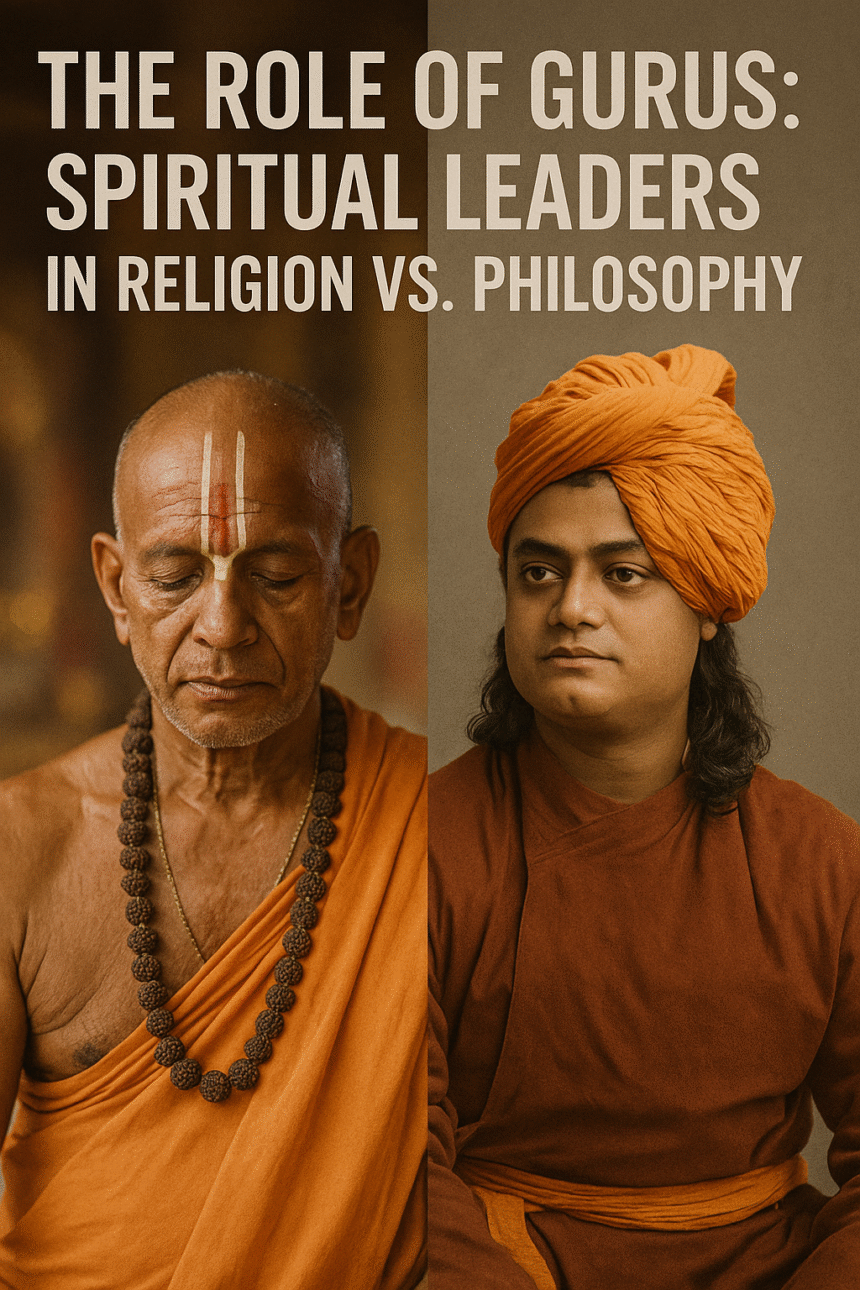The guru, revered as a spiritual teacher and guide, plays a central role in both religion and philosophy, shaping the way individuals approach life’s deeper questions. In religious traditions, the guru serves as a bridge between the divine and the devotee, while in philosophical contexts, the guru is a mentor fostering intellectual inquiry and self-realization.
This article explores the contrasting yet complementary roles of gurus in religion and philosophy, highlighting their timeless significance and evolving relevance in modern spirituality.
The Religious Role of Gurus
In religious traditions, the guru is often viewed as a divinely inspired figure, guiding devotees toward spiritual growth and salvation.
Key Responsibilities in Religion
- Conduit to the Divine: Gurus help individuals connect with higher powers through rituals, prayers, and devotion.
- Moral and Ethical Guidance: By interpreting sacred texts like the Bhagavad Gita or the Bible, they offer clarity on right and wrong.
- Community Leadership: Gurus foster a sense of belonging and shared faith, often leading congregations during festivals and ceremonies.
- Spiritual Discipline: They emphasize practices like meditation, fasting, and chanting to cultivate devotion and inner peace.
Example:
- Guru Nanak, the founder of Sikhism, combined spiritual teachings with social reform, bridging individual devotion with collective well-being.
The Philosophical Role of Gurus
In philosophical traditions, gurus are mentors who guide students in their quest for truth through reason and introspection.
Key Responsibilities in Philosophy
- Encouraging Inquiry: Gurus inspire critical thinking, urging disciples to question and seek deeper truths.
- Interpreters of Universal Truths: They illuminate abstract concepts like Brahman (universal reality) and Atman (self), encouraging self-realization.
- Role of a Catalyst: Philosophical gurus do not provide answers but guide students toward discovering their own path.
- Focus on Liberation: They emphasize achieving Moksha (liberation) through self-awareness and intellectual growth.
Example:
- Socrates, the Greek philosopher, exemplified the guru’s role in philosophy, using the Socratic method to challenge assumptions and uncover truths.
Religion vs. Philosophy: The Guru’s Role Compared
| Aspect | Gurus in Religion | Gurus in Philosophy |
| Focus | Divine connection and moral guidance. | Intellectual growth and self-realization. |
| Approach | Faith-based, emphasizing devotion and rituals. | Reason-based, encouraging questioning and introspection. |
| Community Role | Leads congregations and fosters shared faith. | Guides individual seekers on their intellectual journey. |
| Outcome | Salvation and alignment with divine will. | Liberation through understanding universal truths. |
Interplay Between Religion and Philosophy
While their roles may differ, religious and philosophical gurus often intersect:
- Holistic Guidance: Religious gurus often integrate philosophical insights to deepen faith, while philosophical gurus may draw from spiritual traditions to inspire self-inquiry.
- Personal Transformation: Both types of gurus focus on transforming individuals, whether through devotion or intellectual awakening.
- Timeless Teachings: Figures like Adi Shankaracharya demonstrate the seamless blending of religious devotion and philosophical inquiry.
Modern Relevance of Gurus
In a world seeking balance between faith and reason, the role of gurus remains pivotal:
- Spiritual Gurus: Leaders like Dalai Lama provide moral and spiritual guidance, promoting peace and compassion.
- Philosophical Mentors: Thinkers like Jiddu Krishnamurti inspire critical thinking and intellectual exploration, appealing to modern seekers.
- Digital Evolution: Online platforms allow gurus to reach global audiences, democratizing access to their wisdom.
FAQs on the Role of Gurus
What Is the Role of a Guru in Religion?
Gurus in religion act as spiritual leaders, guiding devotees toward divine connection and moral living through rituals and teachings.
How Do Philosophical Gurus Differ?
Philosophical gurus focus on fostering intellectual inquiry and self-realization, encouraging seekers to question and discover their own truths.
Can a Guru Be Both Religious and Philosophical?
Yes, many gurus, such as Adi Shankaracharya, seamlessly blend religious devotion with philosophical insight, creating holistic teachings.
Conclusion: Gurus as Guides Across Realms
Whether in religion or philosophy, the guru serves as a beacon of wisdom, guiding individuals toward a deeper understanding of life and existence. Religious gurus foster faith and devotion, while philosophical mentors inspire critical thinking and intellectual growth.
In today’s fast-paced world, the timeless role of gurus continues to evolve, bridging the gap between tradition and modernity, faith and reason. By embracing both approaches, gurus offer a path to spiritual and intellectual fulfillment, making their teachings relevant and transformative across generations.


Leave a Reply